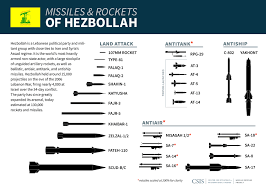HezbollahIsrael fighting Iran’s efforts to upgrade Hezbollah’s rockets
Israel has been countering Iranian efforts to use suitcases to smuggle GPS components into Syria to upgrade Hezbollah’s rocket arsenal. In 2017, once it appeared that Syrian dictator Bashar al-Assad would survive the civil war that was tearing his country apart, “Iran embarked on a grandiose plan for increasing its influence in the shattered country,” says an expert. Iran’s goal was to “build a force of up to 100,000 Shiite fighters from Pakistan, Afghanistan and Iraq. They built intelligence bases and an air force base within each Syrian airbase. And they brought civilians in order to indoctrinate them,” said Israel Defense Force’s former chief of staff, Gen. Gadi Eisenkot.

Iran looks to upgrade Hezbollah's rockets // Source: csis.org
Israel has been countering Iranian efforts to use suitcases to smuggle GPS components into Syria to upgrade Hezbollah’s rocket arsenal, Neri Zilber reported Thursday for the Daily Beast.
In 2017, once it appeared that Syrian dictator Bashar al-Assad would survive the civil war that was tearing his country apart, Zilber, an adjunct fellow of the Washington Institute for Near East Policy, observed, “Iran embarked on a grandiose plan for increasing its influence in the shattered country.”
Iran’s goal was to “build a force of up to 100,000 Shiite fighters from Pakistan, Afghanistan and Iraq. They built intelligence bases and an air force base within each Syrian airbase. And they brought civilians in order to indoctrinate them,” the Israel Defense Force’s former chief of staff, Gen. Gadi Eisenkot told the New York Times in January.
In addition, Zilber wrote, “Iran tried to introduce anti-aircraft systems, rockets and missiles, and a drone program.”
However, Israel countered Iranian efforts to upgrade its arsenal and those of its allies.
In January 2017, Eisenkot received government approval to increase the frequency of attacks against Iranian targets inside of Syria. Last year, Israel reportedly dropped more than 2,000 bombs on targets in Syria.
The stepped-up Israeli attacks against Iranian interests in Syria had an effect.
Israeli Prime Minister Benjamin Netanyahu told VOA Persian earlier this month that while Iran still was in Syria, “they would have been in a much greater presence if we hadn’t done it. And in fact, the presence has shrunken somewhat.”
Iran launched retaliatory strikes against Israel. Last May, Iranian forces fired more than 30 rockets at Israel. None successfully hit targets inside Israel. The Jewish State responded by striking 80 Iranian installations inside Syria.
Overall, Zilber wrote, “Israel was winning the shadow war — a point Israeli political and military leaders haven’t shied away from trumpeting in recent weeks.”
